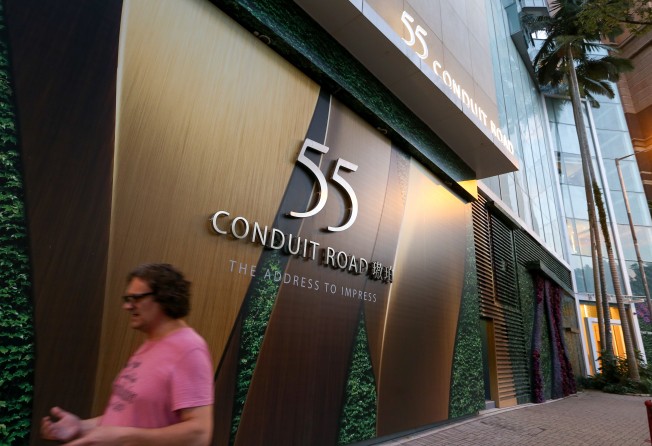Chinese Estates, selling a single home last year, posts a 72 per cent plunge in profit as sales and equity investments shrink
- Chinese Estates sold a single apartment unit last year in Hong Kong, amid a cooling market where a 28-month rally in home prices was stopped in its tracks by rising mortgage rates
- The solitary unit, which sold for HK$286.2 million, contributed HK$125.4 million to the developer’s bottom line

Chinese Estates Holdings, the Hong Kong real estate developer controlled by the family of tycoon Joseph Lau Luen-hung, reported its biggest profit plunge since 2010, as it sold a single apartment unit amid a cooling property market last year.
The company, chaired by Lau’s 38-year-old son Lau Ming-wai, had a tough year in 2018, selling a single home at its 55 Conduit Road luxury project. The 4,170-square-foot (387 square metre) Mid-Levels luxury apartment, which transacted for HK$286.2 million (US$36.5 million), contributed HK$125.4 million to Chinese Estates’ bottom line.
The apartment complex also set the record for having Hong Kong’s most expensive car-parking lot, when a 135-sq ft space changed hands in July for HK$4.8 million. Still, that cache of exclusivity wasn’t enough to halt the 25 per cent decline in gross profit, which fell to HK$719.11 million, from HK$969.8 million. Sales shrank 44.4 per cent to HK$843 million, Chinese Estates said in a filing to the Hong Kong stock exchange.
The company reported a HK$1.27 billion loss from investing in bonds, while its gains from equity investments also plunged, amid slumping stock markets in mainland China and Hong Kong, weighing on its bottom line. Net profit plunged by 72.1 per cent to HK$1.06 billion, from HK$3.8 billion in 2017.
The elder Lau, 66, is Hong Kong’s fourth-wealthiest businessman according to Forbes, with his fortune estimated at US$17 billion. He was a cornerstone investor in the 2009 initial public offering by China Evergrande Group on the Hong Kong exchange. Chinese Estates held 6.6 per cent of China Evergrande as of August 2018, while his wife Chan Hoi-wan held 2.4 per cent.
Evergrande, which listed at HK$3.5 per share in October 2009, was recently unchanged at HK$25.80, valuing Chan’s stake at HK$8.18 billion, and Lau’s stake at an estimated HK$20 billion.
Still, Chinese Estates incurred a HK$3.1 billion unrealised loss on its Evergrande stake, according to a profit warning two weeks ago by the company’s chairman.
Shrugging the loss, Chinese Estates said it had confidence in Evergrande and will continue to buy the shares in the future if the price was reasonable.
“We are looking at the long-term development of Evergrande and are satisfied with the performance of its shares and dividends,” the company said in a written reply to the Post’s query on the company’s holdings in the Chinese developer. “The change in the share price will not lead to any sales and our purpose of holding the shares for long-term gains has not changed.”
Yet, analysts warned about the increasing risks at Chinese Estates, which they no longer consider as a property developer, as the company is making much more from equity investments than property sales.
Chinese Estates holds equity investments worth more than HK$28 billion.
“It’s already very risky to hold such a large amount of shares,” said Alvin Cheung Chi-wai, associate director at Prudential Brokerage. “Besides, is there any need to mention that the company has put much of its investments in only one firm, a highly leveraged mainland property developer.”
Chinese Estates declared a final dividend of 10 HK cents per share, on par with its 2017 payout. The company’s shares fell 1.1 per cent and closed at HK$8.97 on Tuesday after results were announced.